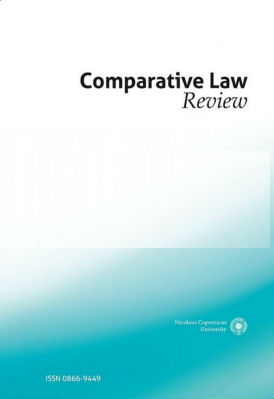THE PRINCIPLES OF CIVIL PROCEDURE IN POLAND IN THE TWENTIETH CENTURY. DOCTRINE, DRAFTS AND LAW IN A COMPARATIVE PERSPECTIVE
THE PRINCIPLES OF CIVIL PROCEDURE IN POLAND IN THE TWENTIETH CENTURY. DOCTRINE, DRAFTS AND LAW IN A COMPARATIVE PERSPECTIVE
Author(s): Anna Machnikowska, Anna Stawarska-RippelSubject(s): Law, Constitution, Jurisprudence, Civil Law
Published by: Wydawnictwo Naukowe Uniwersytetu Mikołaja Kopernika
Keywords: principles of civil procedure; Codification Committee; Second Republic of Poland; People’s Republic of Poland; adversarial principle; dispositive principle; principle of instructionality
Summary/Abstract: Three fundamental state system and legal transformations, which took place in Poland in the 20th century, make the history of the Polish law of civil procedure an important and intriguing research thread, especially in a comparative perspective. The aim of this article is to demonstrate the problem of the principles of civil procedure in codification works which were in progress before the regaining of independence in 1918. They were continued in the Second Republic of Poland and developed further after the Second World War until the second Polish Code of Civil Procedure was adopted in 1964. Codification works in the Second Republic of Poland and the People’s Republic of Poland were quite different regarding their determinants and also conditions. However both presented the phenomenon of a deviation from the original assumptions and concepts, which were postulated by the authors of the original drafts. Such deviation was usually adverse. The changing fate of Polish civil procedure did not threaten the heritage of Polish jurisprudence. The adversarial and dispositive principles, as well as the principle of oral proceedings and the principle of the free appraisal of evidence were constantly present in the Polish legal system. Nevertheless, after World War II some significant modifications were imposed that limited the autonomy of the parties and the independence of the court owing to the political subordination to the Soviet Union. However, the attitude of the majority of Polish lawyers enabled many standards of the classic judicial proceedings to be maintained, and thereby also the relations with the European doctrine of procedural law.
Journal: Comparative Law Review
- Issue Year: 21/2016
- Issue No: 1
- Page Range: 81-153
- Page Count: 72
- Language: English

